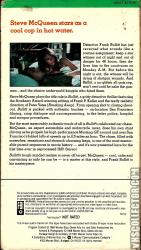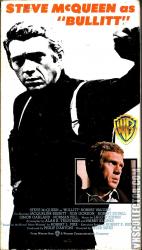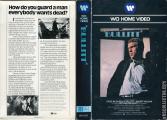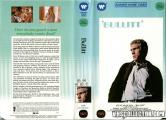Bullitt
Catalog Number
1029
-
Primary Distributor (If not listed, select "OTHER")
Catalog Number
1029
Primary Distributor (If not listed, select "OTHER")
Release Year
Country
N/A (NTSC)
N/A | N/A | N/A
N/A | N/A
Bullitt (1968)
Additional Information
Additional Information
Steve McQueen As 'Bullitt'
The word 'cop' isn't written all over him - something more puzzling is.
There are bad cops and there are good cops - and then there's Bullitt.
"BULLITT comes to this theatre soon. That ought to shake up the place pretty good. Not many freaky cops like BULLITT around. You look at the Italian shoes and the turtleneck and you have to wonder. You listen to the official beefs about 'personal misconduct', 'disruptive influence', you figure he's got to be up for trade. But when some rare Chicago blood starts spilling in San Francisco, they give BULLITT the mop. They weren't exactly doing him a favour. But they've done a great big one for you"
Detective Lt. Frank Bullitt - some other kind of cop. Pity the guy he works for.
Robert L. Pike's crime novel Mute Witness makes the transition to the big screen in this film from director Peter Yates. In one of his most famous roles, Steve McQueen stars as tough-guy police detective Frank Bullitt. The story begins with Bullitt assigned to a seemingly routine detail, protecting mafia informant Johnny Ross (Pat Renella), who is scheduled to testify against his Mob cronies before a Senate subcommittee in San Francisco. But when a pair of hitmen ambush their secret location, fatally wounding Ross, things don't add up for Bullitt, so he decides to investigate the case on his own. Unfortunately for him, ambitious senator Walter Chalmers (Robert Vaughn), the head of the aforementioned subcommittee, wants to shut his investigation down, hindering Bullitt's plan to not only bring the killers to justice but discover who leaked the location of the hideout.
Bullitt is a 1968 American dramatic thriller film directed by Peter Yates and produced by Philip D'Antoni. It stars Steve McQueen, Robert Vaughn and Jacqueline Bisset. The screenplay by Alan R. Trustman and Harry Kleiner was based on the 1963 novel Mute Witness by Robert L. Fish, writing under the pseudonym Robert L. Pike. Lalo Schifrin wrote the original jazz-inspired score, arranged for brass and percussion. Robert Duvall has a small part as a cab driver who provides information to McQueen.
The film was made by McQueen's Solar Productions company, with his then-partner Robert E. Relyea as executive producer. Released by Warner Bros.-Seven Arts on October 17, 1968, the film was a critical and box office smash, later winning the Academy Award for Best Film Editing (Frank P. Keller) and receiving a nomination for Best Sound. Writers Trustman and Kleiner won a 1969 Edgar Award from the Mystery Writers of America for Best Motion Picture Screenplay. Bullitt is notable for its car chase scene through the streets of San Francisco, regarded as one of the most influential in movie history.[2][3][4][5]
In 2007, Bullitt was selected for preservation in the United States National Film Registry by the Library of Congress as being "culturally, historically, or aesthetically significant".[6] In 2008, the Ford Motor Company produced the Mustang Bullitt model for the 40th anniversary of the film.
Bullitt was well received by critics and is considered by some as one of the best films of 1968.[19][20][21] Renata Adler made the film a NYT Critics Pick, saying its a "terrific movie, just right for Steve McQueen –fast, well acted, written the way people talk"; accord to Adler, "the ending should satisfy fans from Dragnet to Camus."[22]
In 2004, The New York Times placed the film on its list of The Best 1000 Movies Ever Made.[18] In 2011, Time magazine listed it among the "The 15 Greatest Movie Car Chases of All Time", describing it as "the one, the first, the granddaddy, the chase on the top of almost every list", and saying "Bullitt‘s car chase is a reminder that every great such scene is a triumph of editing as much as it is stunt work. Naturally, it won that year's Academy Award for Best Editing".[23] Among 21st century critics, it holds a 97% "Fresh" rating on Rotten Tomatoes, representing positive reviews from 32 of 33 critics as of October 2011
Release Date: October 17, 1968
Distrib: Warner Brothers
Box Office $42,300,873 2013: $249,866,000
The word 'cop' isn't written all over him - something more puzzling is.
There are bad cops and there are good cops - and then there's Bullitt.
"BULLITT comes to this theatre soon. That ought to shake up the place pretty good. Not many freaky cops like BULLITT around. You look at the Italian shoes and the turtleneck and you have to wonder. You listen to the official beefs about 'personal misconduct', 'disruptive influence', you figure he's got to be up for trade. But when some rare Chicago blood starts spilling in San Francisco, they give BULLITT the mop. They weren't exactly doing him a favour. But they've done a great big one for you"
Detective Lt. Frank Bullitt - some other kind of cop. Pity the guy he works for.
Robert L. Pike's crime novel Mute Witness makes the transition to the big screen in this film from director Peter Yates. In one of his most famous roles, Steve McQueen stars as tough-guy police detective Frank Bullitt. The story begins with Bullitt assigned to a seemingly routine detail, protecting mafia informant Johnny Ross (Pat Renella), who is scheduled to testify against his Mob cronies before a Senate subcommittee in San Francisco. But when a pair of hitmen ambush their secret location, fatally wounding Ross, things don't add up for Bullitt, so he decides to investigate the case on his own. Unfortunately for him, ambitious senator Walter Chalmers (Robert Vaughn), the head of the aforementioned subcommittee, wants to shut his investigation down, hindering Bullitt's plan to not only bring the killers to justice but discover who leaked the location of the hideout.
Bullitt is a 1968 American dramatic thriller film directed by Peter Yates and produced by Philip D'Antoni. It stars Steve McQueen, Robert Vaughn and Jacqueline Bisset. The screenplay by Alan R. Trustman and Harry Kleiner was based on the 1963 novel Mute Witness by Robert L. Fish, writing under the pseudonym Robert L. Pike. Lalo Schifrin wrote the original jazz-inspired score, arranged for brass and percussion. Robert Duvall has a small part as a cab driver who provides information to McQueen.
The film was made by McQueen's Solar Productions company, with his then-partner Robert E. Relyea as executive producer. Released by Warner Bros.-Seven Arts on October 17, 1968, the film was a critical and box office smash, later winning the Academy Award for Best Film Editing (Frank P. Keller) and receiving a nomination for Best Sound. Writers Trustman and Kleiner won a 1969 Edgar Award from the Mystery Writers of America for Best Motion Picture Screenplay. Bullitt is notable for its car chase scene through the streets of San Francisco, regarded as one of the most influential in movie history.[2][3][4][5]
In 2007, Bullitt was selected for preservation in the United States National Film Registry by the Library of Congress as being "culturally, historically, or aesthetically significant".[6] In 2008, the Ford Motor Company produced the Mustang Bullitt model for the 40th anniversary of the film.
Bullitt was well received by critics and is considered by some as one of the best films of 1968.[19][20][21] Renata Adler made the film a NYT Critics Pick, saying its a "terrific movie, just right for Steve McQueen –fast, well acted, written the way people talk"; accord to Adler, "the ending should satisfy fans from Dragnet to Camus."[22]
In 2004, The New York Times placed the film on its list of The Best 1000 Movies Ever Made.[18] In 2011, Time magazine listed it among the "The 15 Greatest Movie Car Chases of All Time", describing it as "the one, the first, the granddaddy, the chase on the top of almost every list", and saying "Bullitt‘s car chase is a reminder that every great such scene is a triumph of editing as much as it is stunt work. Naturally, it won that year's Academy Award for Best Editing".[23] Among 21st century critics, it holds a 97% "Fresh" rating on Rotten Tomatoes, representing positive reviews from 32 of 33 critics as of October 2011
Release Date: October 17, 1968
Distrib: Warner Brothers
Box Office $42,300,873 2013: $249,866,000
Related Links
Related Releases3
Catalog Number
WB 1029
Primary Distributor (If not listed, select "OTHER")
Bullitt (1968)
Release Year
Catalog Number
WB 1029
Primary Distributor (If not listed, select "OTHER")
Catalog Number
WB 1029
Catalog Number
WB 1029
Primary Distributor (If not listed, select "OTHER")
Bullitt (1968)
Release Year
Catalog Number
WB 1029
Primary Distributor (If not listed, select "OTHER")
Catalog Number
WB 1029
Catalog Number
1029
Primary Distributor (If not listed, select "OTHER")
Bullitt (1968)
Release Year
Catalog Number
1029
Primary Distributor (If not listed, select "OTHER")
Catalog Number
1029












Comments0
Login / Register to post comments